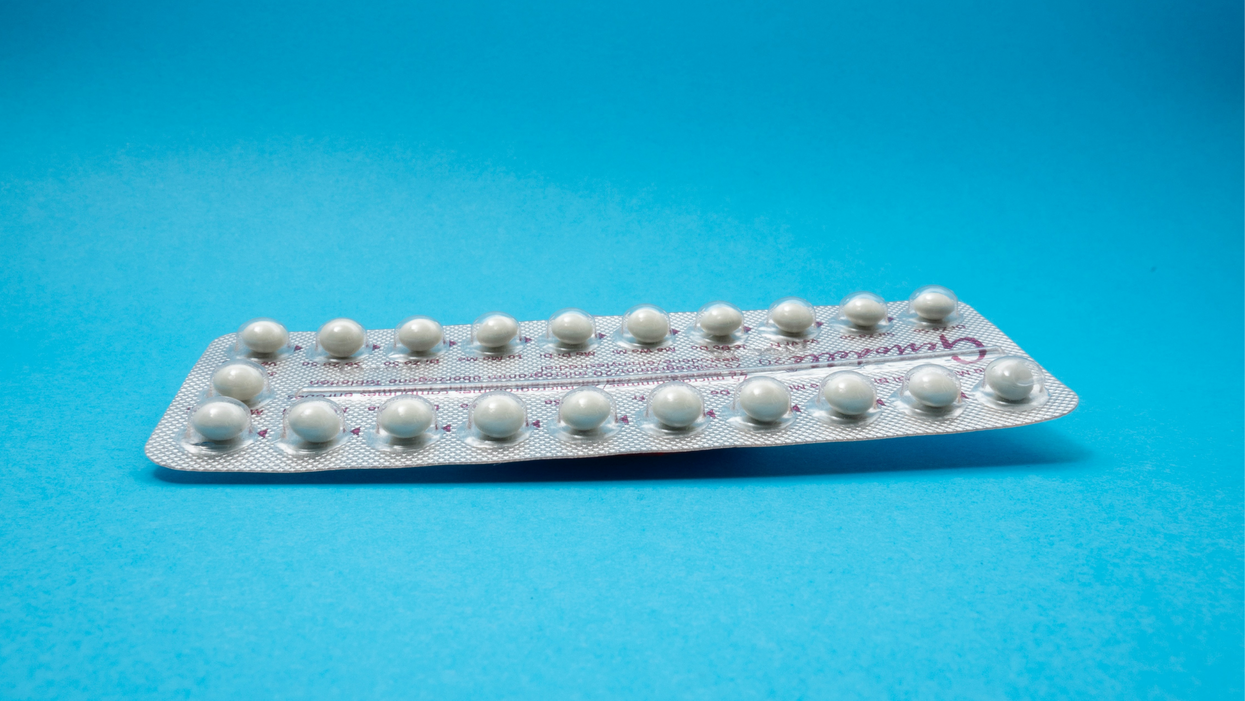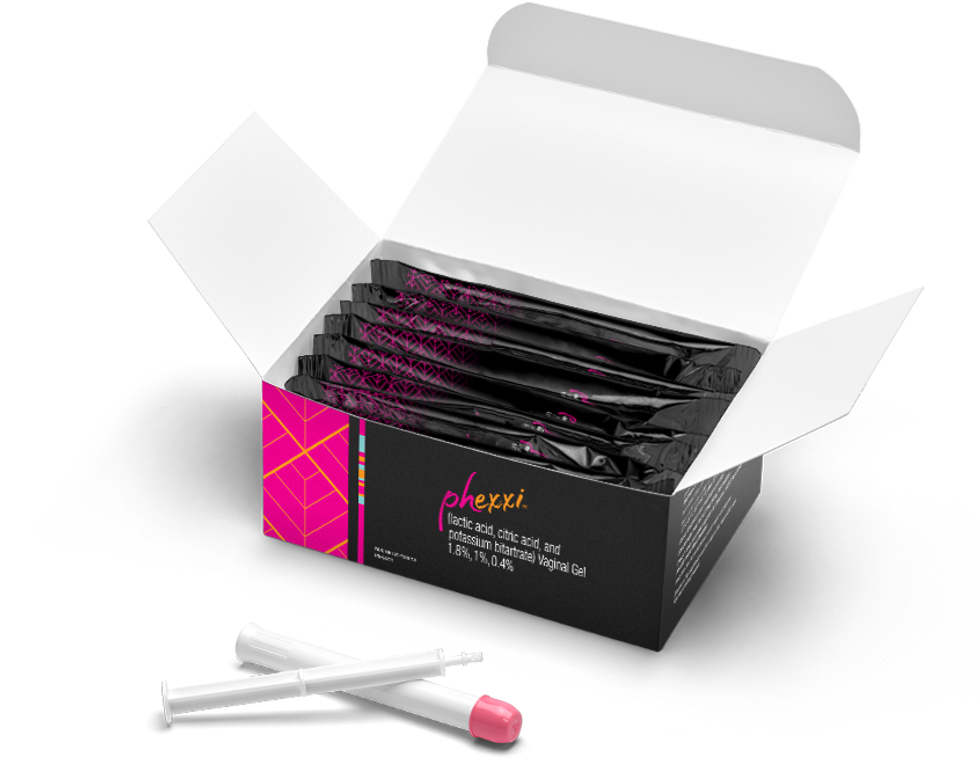New Options Are Emerging in the Search for Better Birth Control

A decade ago, Elizabeth Summers' options for birth control suddenly narrowed. Doctors diagnosed her with Factor V Leiden, a rare genetic disorder, after discovering blood clots in her lungs. The condition increases the risk of clotting, so physicians told Summers to stay away from the pill and other hormone-laden contraceptives. "Modern medicine has generally failed to provide me with an effective and convenient option," she says.
But new birth control options are emerging for women like Summers. These alternatives promise to provide more choices to women who can't ingest hormones or don't want to suffer their unpleasant side effects.
These new products have their own pros and cons. Still, doctors are welcoming new contraceptives following a long drought in innovation. "It's been a long time since we've had something new in the world of contraception," says Heather Irobunda, an obstetrician and gynecologist at NYC Health and Hospitals.
On social media, Irobunda often fields questions about one of these new options, a lubricating gel called Phexxi. San Diego-based Evofem, the company behind Phexxi, has been advertising the product on Hulu and Instagram after the gel was approved by the Food and Drug Administration in May 2020. The company's trendy ads target women who feel like condoms diminish the mood, but who also don't want to mess with an IUD or hormones.
Here's how it works: Phexxi is inserted via a tampon-like device up to an hour before sex. The gel regulates vaginal pH — essentially, the acidity levels — in a range that's inhospitable to sperm. It sounds a lot like spermicide, which is also placed in the vagina prior to sex to prevent pregnancy. But spermicide can damage the vagina's cell walls, which can increase the risk of contracting sexually transmitted diseases.
"Not only is innovation needed, but women want a non-hormonal option."
Phexxi isn't without side effects either. The most common one is vaginal burning, according to a late-stage trial. It's also possible to develop a urinary tract infection while using the product. That same study found that during typical use, Phexxi is about 86 percent effective at preventing pregnancy. The efficacy rate is comparable to condoms but lower than birth control pills (91 percent) and significantly lower than an IUD (99 percent).
Phexxi – which comes in a pack of 12 – represents a tiny but growing part of the birth control market. Pharmacies dispensed more than 14,800 packs from April through June this year, a 65 percent increase over the previous quarter, according to data from Evofem.
"We've been able to demonstrate that not only is innovation needed, but women want a non-hormonal option," says Saundra Pelletier, Evofem's CEO.
Beyond contraception, the company is carrying out late-stage tests to gauge Phexxi's effectiveness at preventing the sexually transmitted infections chlamydia and gonorrhea.

Phexxi is inserted via a tampon-like device up to an hour before sex.
Phexxi
A New Pill
The first birth control pill arrived in 1960, combining the hormones estrogen and progestin to stop sperm from joining with an egg, giving women control over their fertility. Subsequent formulations sought to ease side effects, by way of lower amounts of estrogen. But some women still experience headaches and nausea – or more serious complications like blood clots. On social media, women recently noted that birth control pills are much more likely to cause blood clots than Johnson & Johnson's COVID-19 vaccine that was briefly paused to evaluate the risk of clots in women under age 50. What will it take, they wondered, for safer birth control?
Mithra Pharmaceuticals of Belgium sought to create a gentler pill. In April, the FDA approved Mithra's Nextstellis, which includes a naturally occurring estrogen, the first new estrogen in the U.S. in 50 years. Nextstellis selectively acts on tissues lining the uterus, while other birth control pills have a broader target.
A Phase 3 trial showed a 98 percent efficacy rate. Andrew London, an obstetrician and gynecologist, who practices at several Maryland hospitals, says the results are in line with some other birth control pills. But, he added, early studies indicate that Nextstellis has a lower risk of blood clotting, along with other potential benefits, which additional clinical testing must confirm.
"It's not going to be worse than any other pill. We're hoping it's going to be significantly better," says London.
The estrogen in Nexstellis, called estetrol, was skipped over by the pharmaceutical industry after its discovery in the 1960s. Estetrol circulates between the mother and fetus during pregnancy. Decades later, researchers took a new look, after figuring out how to synthesize estetrol in a lab, as well as produce estetrol from plants.
"That allowed us to really start to investigate the properties and do all this stuff you have to do for any new drug," says Michele Gordon, vice president of marketing in women's health at Mayne Pharma, which licensed Nextstellis.
Bonnie Douglas, who followed the development of Nextstellis as part of a search for better birth control, recently switched to the product. "So far, it's much more tolerable," says Douglas. Previously, the Midwesterner was so desperate to find a contraceptive with fewer side effects that she turned to an online pharmacy to obtain a different birth control pill that had been approved in Canada but not in the U.S.
Contraceptive Access
Even if a contraceptive lands FDA approval, access poses a barrier. Getting insurers to cover new contraceptives can be difficult. For the uninsured, state and federal programs can help, and companies should keep prices in a reasonable range, while offering assistance programs. So says Kelly Blanchard, president of the nonprofit Ibis Reproductive Health. "For innovation to have impact, you want to reach as many folks as possible," she says.
In addition, companies developing new contraceptives have struggled to attract venture capital. That's changing, though.
In 2015, Sabrina Johnson founded DARÉ Bioscience around the idea of women's health. She estimated the company would be fully funded in six months, based on her track record in biotech and the demand for novel products.
But it's been difficult to get male investors interested in backing new contraceptives. It took Johnson two and a half years to raise the needed funds, via a reverse merger that took the company public. "There was so much education that was necessary," Johnson says, adding: "The landscape has changed considerably."
Johnson says she would like to think DARÉ had something to do with the shift, along with companies like Organon, a spinout of pharma company Merck that's focused on reproductive health. In surveying the fertility landscape, DARÉ saw limited non-hormonal options. On-demand options – like condoms – can detract from the moment. Copper IUDs must be inserted by a doctor and removed if a woman wants to return to fertility, and this method can have onerous side effects.
So, DARÉ created Ovaprene, a hormone-free device that's designed to be inserted into the vagina monthly by the user. The mesh product acts as a barrier, while releasing a chemical that immobilizes sperm. In an early study, the company reported that Ovaprene prevented almost all sperm from entering the cervical canal. The results, DARÉ believes, indicate high efficacy.
A late-stage study, slated to kick off next year, will be the true judge. Should Ovaprene eventually win regulatory approval, drug giant Bayer will handle commercializing the device.
Other new forms of birth control in development are further out, and that's assuming they perform well in clinical trials. Among them: a once-a-month birth control pill, along with a male version of the birth control pill. The latter is often brought up among women who say it's high time that men take a more proactive role in birth control.
For Summers, her search for a safe and convenient birth control continues. She tried Phexxi, which caused irritation. Still, she's excited that a non-hormonal option now exists. "I'm sure it will work for others," she says.
Podcast: The Friday Five weekly roundup in health research
Scientists have designed a phone app that could alert consumers to high levels of cancer-causing chemicals, Yale researchers revive organs in dead pigs, and more in this week's Friday Five.
The Friday Five covers five stories in health research that you may have missed this week. There are plenty of controversies and troubling ethical issues in science – and we get into many of them in our online magazine – but this news roundup focuses on scientific creativity and progress to give you a therapeutic dose of inspiration headed into the weekend.
Listen to the Episode
Listen on Apple | Listen on Spotify | Listen on Stitcher | Listen on Amazon | Listen on Google
Covered in this week's Friday Five:
- A new blood test for cancer
- Patches of bacteria can use your sweat to power electronic devices
- Researchers revive organs of dead pigs
- Phone apps detects cancer-causing chemicals in foods
- Stem cells generate "synthetic placentas" in mice
Plus, an honorable mention for early research involving vitamin K and Alzheimer's
The limits of digital privacy are becoming clearer in the post-Dobbs era, as a wide range of data sources can reveal online and offline activities, including whether a woman seeks an abortion.
Since the recent reversal of Roe v. Wade — the landmark decision establishing a constitutional right to abortion — the vulnerabilities of reproductive health data and various other information stored on digital devices or shared through the Web have risen to the forefront.
Menstrual period tracking apps are an example of how technologies that collect information from users could be weaponized against abortions seekers. The apps, which help tens of millions of users in the U.S. predict when they’re ovulating, may provide evidence that leads to criminal prosecution in states with abortion bans, says Anton T. Dahbura, executive director of the Johns Hopkins University Information Security Institute. In states where abortion is outlawed, “it’s probably best to not use a period tracker,” he says.
Following the Dobbs v. Jackson ruling in late June that overturned Roe, even women who suffered a miscarriage could be suspected of having an abortion in some cases. While using these apps in anonymous mode may appear more secure, “data is notoriously difficult to perfectly anonymize,” Dahbura says. “Whether the data are stored on the user’s device or in the cloud, there are ways to connect that data to the user.”
Completely concealing one’s tracks in cyberspace poses enormous challenges. Digital forensics can take advantage of technology such as GPS apps, security cameras, license plate trackers, credit card transactions and bank records to reconstruct a person’s activities,” Dahbura says. “Abortion service providers are also in a world of risk for similar reasons.”
Practicing “good cyber hygiene” is essential. That’s particularly true in states where private citizens may be rewarded for reporting on women they suspect of having an abortion, such as Texas, which passed a so-called bounty hunter law last fall. To help guard against hacking, Dahbura suggests using strong passwords and two-factor authentication when possible while remaining on alert for phishing scams on email or texts.
Another option for safeguarding privacy is to avoid such apps entirely, but that choice will depend on an individual’s analysis of the risks and benefits, says Leah Fowler, research assistant professor at the University of Houston Law Center, Health Law & Policy Institute.
“These apps are popular because people find them helpful and convenient, so I hesitate to tell anyone to get rid of something they like without more concrete evidence of its nefarious uses,” she says. “I also hate the idea that asking anyone capable of becoming pregnant to opt out of all or part of the digital economy could ever be a viable solution. That’s an enormous policy failure. We have to do better than that.”
The potential universe of abortion-relevant data can include information from a variety of fitness and other biometric trackers, text and social media chat records, call details, purchase histories and medical insurance records.
Instead, Fowler recommends that concerned consumers read the terms of service and privacy policies of the apps they’re using. If some of the terms are unclear, she suggests emailing customer service with questions until the answers are satisfactory. It’s also wise for consumers to research products that meet their specific needs and find out whether other women have raised concerns about specific apps. Users interested in more privacy may want to switch to an app that stores data locally, meaning the data stays on your device, or does not use third-party tracking, so the app-maker is the only company with access to it, she says.
Period tracking apps can be useful for those on fertility journeys, making it easier to store information digitally than on paper charts. But users may want to factor in whether they live in a state with an anti-abortion stance and run the risk of legal issues due to a potential data breach, says Carmel Shachar, executive director of the Petrie-Flom Center for Health Law Policy, Biotechnology, and Bioethics at Harvard Law School.
Consumers’ risks extend beyond period tracking apps in the post-Roe v. Wade era. “Anything that creates digital breadcrumbs to your reproductive choices and conduct could raise concerns — for example, googling ‘abortion providers near me’ or texting your best friend that you are pregnant but do not want to be,” Shachar says. Women also could incriminate themselves by bringing their phones, which may record geolocation data, to the clinic with them.
The potential universe of abortion-relevant data can include information from a variety of fitness and other biometric trackers, text and social media chat records, call details, purchase histories and medical insurance records, says Rebecca Wexler, faculty co-director of the Berkeley Center for Law & Technology. “These data sources can reveal a pregnant person’s decision to seek or obtain an abortion, as well as reveal a healthcare provider’s provision of abortion services and anyone else’s provision of abortion assistance,” she says.
In some situations, people or companies could inadvertently expose themselves to risk after posting on social media with offers of places for abortion seekers to stay after traveling from states with bans. They could be liable for aiding and abetting abortion. At this point, it’s unclear whether states that ban abortion will try to prosecute residents who seek abortions in other states without bans.
Another possibility is that a woman seeking an abortion will be prosecuted based not only on her phone’s data, but also on the data that law enforcement finds on someone else’s device or a shared computer. As a result, “people in one household may find themselves at odds with each other,” says K Royal, faculty fellow at the Center for Law, Science, and Innovation at Arizona State University’s Sandra Day O'Connor College of Law. “This is a very delicate situation.”
Individuals and corporate executives should research their options before leaving a digital footprint. “Guard your privacy carefully, whether you are seeking help or you are seeking to help someone,” Royal says. While she has come across recommendations from other experts who suggest carrying a second phone that is harder to link a person’s identity for certain online activities, “it’s not practical on a general basis.”
The privacy of this health data isn’t fully protected by the law because period trackers, texting services and other apps are not healthcare providers — and as a result, there’s no prohibition on sharing the information with a third party under the Health Insurance Portability and Accountability Act of 1996, says Florencia Marotta-Wurgler, a professor who specializes in online consumer contracts and data privacy at the NYU School of Law.
“So, as long as there is valid consent, then it’s fair game unless you say that it violates the reasonable expectations of consumers,” she says. “But this is pretty unchartered territory at the moment.”
As states implement laws granting anyone the power to report suspected or known pregnancies to law enforcement, anti-choice activists are purchasing reproductive health data from companies that make period apps, says Rebecca Herold, chief executive officer of Privacy & Security Brainiacs in Des Moines, Iowa, and a member of the Emerging Trends Working Group at ISACA, an association focused on information technology governance. They could also buy data on search histories and make it available in places like Texas for “bounty hunters” to find out which women have searched for information about abortions.
Some groups are creating their own apps described as providing general medical information on subjects such as pregnancy health. But they are “ultimately intended to ‘catch’ women” — to identify those who are probably pregnant and dissuade them from having an abortion, to launch harassment campaigns against them, or to report them to law enforcement, anti-choice groups and others in states where such prenatal medical care procedures are now restricted or prohibited, Herold says.
In addition to privacy concerns, the reversal of Roe v. Wade raises censorship issues. Facebook and Instagram have started to remove or flag content, particularly as it relates to providing the abortion pill, says Michael Kleinman, director of the Silicon Valley Initiative at Amnesty International USA, a global organization that promotes human rights.
Facebook and Instagram have rules that forbid private citizens from buying, selling or giving away pharmaceuticals, including the abortion pill, according to a social media post by a communications director for Meta, which owns both platforms. In the same post, though, the Meta official noted that the company’s enforcement of this rule has been “incorrect” in some cases.
“It’s terrifying to think that arbitrary decisions by these platforms can dramatically limit the ability of people to access critical reproductive rights information,” Kleinman says. However, he adds, “as it currently stands, the platforms make unilateral decisions about what reproductive rights information they allow and what information they take down.”

